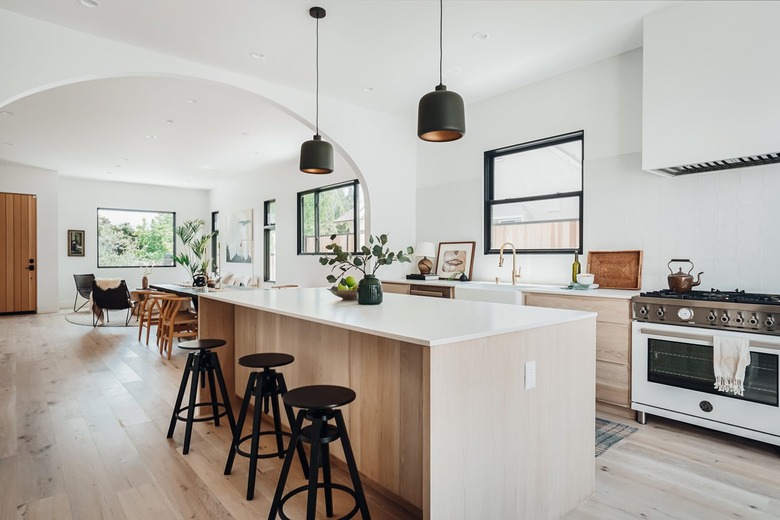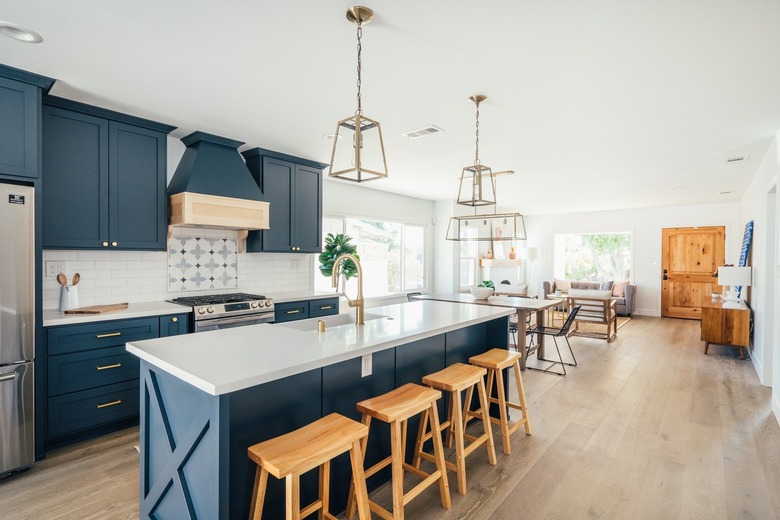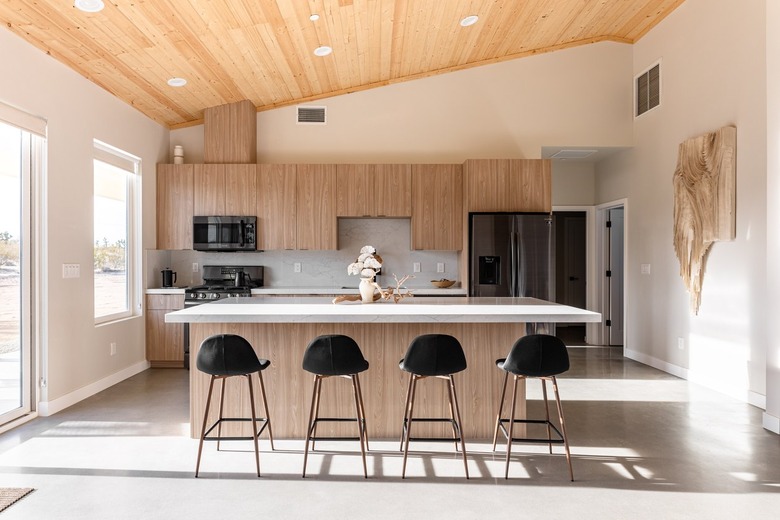What To Know Before You Hire A Kitchen Contractor
For years, you've dreamed of doing a kitchen remodel to give you increased cook space, less clutter, and more features than your current kitchen (and let's be honest, you're also eager to ditch those laminate counters and swap them out for some gorgeous quartz). Now, after years of planning and saving, you're finally ready to take the next step and hire a contractor.
Either a general contractor or a dedicated kitchen remodeling contractor can handle every aspect of a kitchen renovation, starting with obtaining the permits and ending with the final building inspection. Many of these contractors go beyond simply installing new cabinets and built-in stainless steel appliances and can help you design your dream kitchen as well, though many homeowners prefer to work with a dedicated kitchen designer.
Ready to get started on your renovation? Here's everything you need to know about hiring someone to help realize your kitchen goals.
What a Kitchen Contractor Does
What a Kitchen Contractor Does
Kitchen remodeling contractors handle the entire scope of the remodeling project, including obtaining permits, scheduling inspections, obtaining materials, demolishing your existing kitchen, preparing your structure for new construction, and constructing and installing your entire new kitchen. Some of these contractors even handle larger projects that require moving or replacing walls or ceilings. While some contractors perform all the work themselves, others will use subcontractors to do specialty work, such as pouring concrete countertops or wiring electrical connections.
A few contracting firms will even help you with the kitchen design or architectural plan process as well, though you may choose to work with your own kitchen designer or architect. Kitchens in particular require extensive planning because they are more complicated than most other rooms; you need to plan for plumbing, electrical, gas, appliances, fixtures, lighting, storage, prep areas, and more. The kitchen's functionality isn't the only thing that matters; the design must also be welcoming and attractive since so many people socialize inside the kitchen.
Doing Your Homework
Doing Your Homework
Before reaching out to a contractor, you should have a good idea of what needs to be done to your kitchen and your total budget. When it comes to creating an overall budget, the rule of thumb is that a kitchen remodel should be worth between 5 and 15 percent of a home's total value. In other words, a remodel for a home worth $350,000 should cost anywhere from $17,500 to $52,500. That being said, your specific costs will vary dramatically based on the size of your room, what you want to change, and what types of luxuries and appliances you plan to add.
The average cost of a kitchen remodel for a 200-square-foot space is $25,600. When homeowners decide to either change the structure of the home to expand the kitchen's footprint or do a luxury renovation with stone countertops, custom cabinets, new wooden flooring, and more, the budget can easily be as high as $150,000. On the other hand, a budget kitchen makeover where the homeowner DIYs some of the work and simply refaces the cabinets, installs new countertops, and changes out a few appliances could cost as little as $8,000. Remember that your overall project budget needs to cover not only the materials and labor but also contractor fees and any payments to outside kitchen designers or architects.
When deciding what changes to make, spend some time looking at pictures of beautiful kitchens and visiting home improvement stores or design showrooms. Write a list detailing what styles and features you like in a kitchen as well as what changes need to be made to your existing kitchen to make it more functional. Sit down with your list of ideas and decide what absolutely needs to be done, what you would like to add, and what features or design touches you like that are probably out of your budget entirely.
Kitchen Contractor vs. Other Kitchen Pros
Kitchen Contractor vs. Other Kitchen Pros
When you're planning a kitchen renovation, it can be confusing to know which type of professional you should hire. There are four main professionals you should consider for a kitchen remodel, but it should be noted that you don't often need all four to complete the project.
You'll typically need to hire at least a general contractor or a kitchen remodel contractor (unless you're going to DIY the majority of the project and only need to work with a handful of subcontractors as needed, like an electrician and a plumber). Some homeowners may also benefit from working with a kitchen designer, even if they plan on doing some of the work themselves. If you are planning a major renovation that changes the actual structure of your home, you may also need an architect, but they are unnecessary for the majority of kitchen remodeling projects.
General Contractor
General contractors are remodeling professionals who can construct any part of a home or an entirely new home. They are seen as the project manager of a renovation — controlling all of the scheduling, hiring subcontractors, and procuring the supplies.
When choosing a general contractor for a kitchen remodel, select someone who has ample experience building kitchens and a portfolio reflecting their experience in this area. A general contractor may be preferable to a specialized kitchen remodeler if you plan to expand the walls or raise the ceiling of the kitchen or if you are simultaneously remodeling another area of the home.
Kitchen Remodeling Contractor
Kitchen remodeling contractors are similar to general contractors, except instead of doing projects in all parts of the home, their focus is on the kitchen. For the majority of kitchen renovations, this specialization is preferable, as a kitchen remodeling contractor will have a better grasp on installing appliances, kitchen cabinets, countertops, faucets, light fixtures, backsplashes, etc. Additionally, their familiarity with kitchen design fundamentals and trends could be enough guidance to help you through the design process, and some larger, more high-end companies may have in-house designers.
Kitchen Designers
While not always essential, especially if you work with a knowledgeable remodeler, kitchen designers can be quite useful in helping to ensure you get the best possible results for your given budget. These professionals don't just know brands, budgets, and common design styles; they also have knowledge of important kitchen design fundamentals that can help ensure the space functions properly for you and your family, and their final design will take into account ease of use, traffic flow, kitchen workflow, lighting, storage, and more. If you don't have any idea of what a "golden triangle" is and you aren't quite sure of the difference between "Scandinavian" and "modern" design, it can pay to hire a kitchen designer, especially if your remodeler lacks this expertise.
Architects
An architect is overkill for most kitchen remodels, but if your plans involve significant structural changes to the kitchen, then you may need to hire an architect to figure out how to best modify the kitchen in a way that adheres to local building codes and maintains the structural integrity of your home. An architect is responsible for coming up with the plans for any structural modifications and for getting those plans approved by your city government, but typically, the architect will not help you figure out the finer details of the kitchen layout, such as where cabinets, appliances, or islands may be situated.
Choosing the Right Kitchen Contractor
Choosing the Right Kitchen Contractor
Start looking for a contractor by asking friends and family members for referrals or by searching online. Look up reviews for any contractors who interest you to see if they have any dissatisfied customers and review their Better Business Bureau profile to ensure they have no open customer complaints.
You'll want to get bids from at least a few kitchen pros before deciding on the right contractor for your job, so make sure to find a few companies that seem reliable. Set up an interview with each company to ask questions about its business practices and to talk about your project. A few things you'll want to find out include:
- The company's experience and years in business
- What special certifications they may hold
- A list of references from former
clients - Whether they use subcontractors
- How the payment structure works
When you have finalized your vision of what you'd like your kitchen to look like after talking to contractors or a kitchen designer, put together a project brief that contains as much detail as possible about what needs to be done, including what materials, brands, or products you plan to use. Call each company's references to verify them. Then, provide your brief to all contractors who have passed your screening so they can prepare bids based on this information.
Once you've received the bids, review them to ensure they have all the necessary details and that you agree with the contractor's proposed terms. Bids should include:
- An overall price
- A full scope of the work being done with itemized
pricing - A payment schedule
- A timeline of the work being completed
- Information on what happens when unexpected
changes arise and the company needs a change order - Information about any warranties offered
- Dispute resolution information
While you want to maximize your budget, don't always choose the cheapest company. Be sure to balance the contractor's skills and experience with the overall price. You may be able to negotiate a little if you like a particular contractor but find the bid to be a little too high. Remember that it's better to pay a little extra to get your dream kitchen than save some money and end up with something that isn't entirely satisfying.
The Cost of Hiring a Kitchen Contractor
The Cost of Hiring a Kitchen Contractor
Both general contractors and contractors who specialize in kitchen remodeling projects typically charge a flat fee per job that includes the cost of all materials, labor, subcontractors, permits, and inspections. Typically, the contractor will keep around 10 to 25 percent of the total cost of the project, which amounts to around $3,500 to $6,000 for the average kitchen remodel. Most contractors require a down payment of 30 to 50 percent and will expect to be paid the remaining balance after the job has been completed.
The average price for independent kitchen designers is around $12,250, though inexpensive designers can be found for as little as $1,500. Some designers charge by the hour at rates between $65 and $250 an hour, so it's important to ask designers who do not charge a flat fee how many hours they believe the project will take.
Architects typically don't charge hourly rates, but they may for smaller jobs, such as kitchen remodels. In these cases, rates are typically between $45 and $250 an hour. Similarly, some architects charge based on the square footage of the project, with rates usually ranging between $2 and $25. For larger projects, architects will generally charge a percentage of the overall project cost at a rate between 8 and 20 percent. So, when an architect bases the fees on the total cost of your kitchen remodel, expect it to cost you between $2,000 and $5,000.
Kitchen Contractor Licensing and Certification
Kitchen Contractor Licensing and Certification
Both general contractors and kitchen remodeling specialists are required to hold a contractor's license. The same is true for any subcontractors with whom they work. Before hiring a contractor to work on your kitchen, check with your state licensing agency to verify that the contractor's license is valid. Also ensure the contractor has valid liability insurance and workers' compensation insurance.
Aside from a contractor's license and insurance, some trade associations have certifications indicating a higher level of experience and credibility. For a kitchen remodeling contractor, for example, it's a particularly good sign if he is recognized as a certified kitchen and bath remodeler by the National Association of the Remodeling Industry or if he is a member of the National Kitchen & Bath Association.
While kitchen designers may not need a contractor's license, they may need to be licensed as a registered interior designer depending on your state's laws. Research the laws in your state before hiring a designer and always verify that anyone you hire has the required licenses. The National Kitchen & Bath Association also offers certification for kitchen designers, so you may want to look for designers who have earned the title of certified kitchen and bath designer, certified kitchen designer, or certified master kitchen and bath designer.
An architect must pass the Architect Registration Exam before becoming licensed with the state, and to maintain a license, many states require architects to undergo periodic training to keep up to date with the latest building codes. Before hiring an architect, always verify that the license is valid.
References
- Better Homes & Gardens: Who to Hire for Your Kitchen Remodel
- HomeAdvisor: How Much Does It Cost To Remodel A Kitchen?
- Forbes: How To Hire A Kitchen Remodeling Contractor
- Kitchen & Bath Experts: 10 Things You Must Know Before You Hire Someone to Remodel Your Kitchen or Bath
- Cliq Studios: How to Hire a Kitchen Remodeling Contractor
- HomeAdvisor: How Much Does An Architect Cost?


